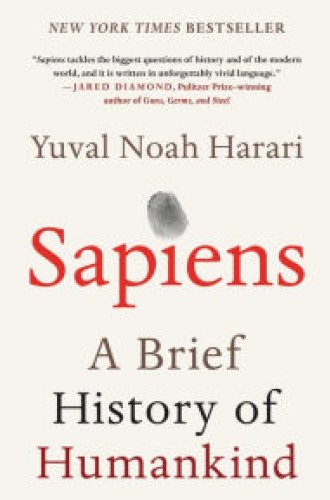Faith makes us human
Somewhere along the evolutionary line, a bipedal ape developed an astonishing level of consciousness of a quality that set it apart from its similarly large-brained relatives. Sapiens is about how that thinking primate transformed the world.
Along the way, Yuval Noah Harari makes this claim: the key to humanness is faith, or the ability to believe in things that aren’t physically there. Abstract notions were impossible for our nearest primate relations, and abstract thinking set the stage for everything that came afterward: the agricultural revolution; science and discovery; cooperation in government, religion, and economics—all because imaginary constructs allow us the “unprecedented ability to cooperate flexibly in large numbers.”
Read our latest issue or browse back issues.
Harari tells us that all the great achievements of humanity—trade, money, corporations, religion, government, science, philosophy, mathematics, literature, music and art, rights and laws, contracts, even relationships—rely on our faculty to create and trust abstractions, a talent that may have first been displayed in religious faith.
Though Sapiens isn’t about faith, faith is a constant presence in the book. Harari sees religion as one of three unifiers of humankind, alongside money and empires. As a human order based on belief in a superhuman order, religion is the source of moral and behavioral standards. The agricultural revolution (though “history’s biggest fraud,” according to Harari, because it produced a lifestyle inferior to hunting and gathering) may have been fostered by religion: it’s possible that a regional religious center like Göbekli Tepe in Turkey could have emerged only after people gave up wandering to maintain it.
Faith, which is associated with imagination, creativity, abstract thinking, and fiction, vaulted us beyond our fellow creatures by almost every metric that matters. But sophisticated religious understanding hasn’t necessarily made us better. Harari reminds us that religious persecution is the invention of monotheism. Polytheists didn’t try to convert those they conquered; gods were a local matter. Monotheists have been fanatical and missional: “Since monotheists have usually believed that they are in possession of the entire message of the one and only God, they have been compelled to discredit all other religions.”
Where has all this frantic sapience brought us? Capitalism and industry have transformed our world, but at a cost to the environment, families, fairness, and—how grateful I am to the author for remembering them!—animals. The chapter “The End of Homo Sapiens” is the stuff of either scientific futurism or science fiction, which are becoming increasingly difficult to distinguish from one another. What happens when humanity remakes itself physically, mentally, socially, and morally? “Despite the astonishing things that humans are capable of doing,” says Harari, “we remain unsure of our goals and we seem to be as discontented as ever.”
A book review can’t do justice to this comprehensive, elegantly imbricated history of us. Generally speaking, one ought to be wary of a thinker whose theory encompasses everything, and Sapiens explores a vast temporal and geographical territory. Yet Harari seems to present not so much a theory as a plausible history of humanness.
Though heavy paper and tables and charts make Sapiens feel a bit textbookish, Harari teaches with the clarity and liveliness of a mountain brook, explaining complex ideas in vivid language free of jargon.
In a world that seems so hostile to faith, I admit some satisfaction when a secular thinker makes the case for its centrality, even if that isn’t Harari’s intention. Sometimes we people of faith aren’t quite comfortable with faith alone. We wish that something in the history of humankind would prove beyond doubt that Someone humanized us, that Someone obliged us large-brained, bipedal primates with a breath of consciousness that made us, in a fundamental way, thinkers like our Creator. Alas, neither revelation nor science will satisfy our wish for certainty. Still, Harari’s pivotal point in Sapiens is that faith is as necessary to our humanness as our biology.
What Harari calls faith doesn’t mean goodness; the extraordinarily abstract machinery of capitalism is only as moral as its practitioners. And the ability to imagine what isn’t there doesn’t mean that everything we can imagine actually is. Yet here is at least a small admission, from the very academic disciplines that some Christians complain have pushed God out of every gap, that faith is an essential ingredient in the human formula. It’s not a theology, far less a proof of anything. But I’ll take it.






